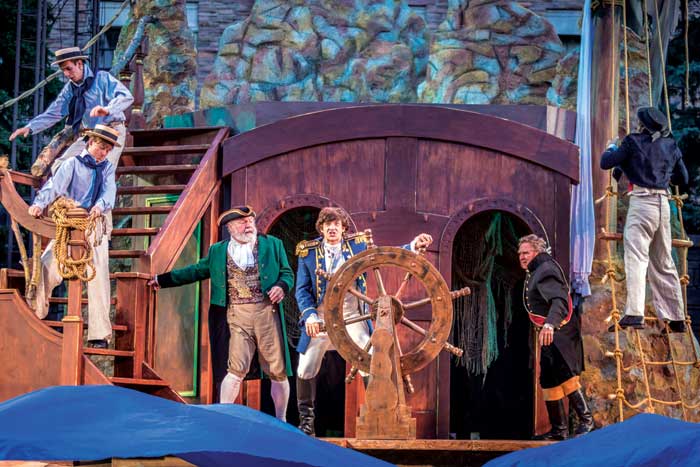
From left, Eddy Jordan, Will Hunsaker, Michael Winters, Benjamin Bonenfant, Chris Kendall and Benaiah Anderson at a production of The Tempest in Boulder.
There’s something for everyone in The Tempest, this year’s Shakespeare on The Green production presented by the Colorado Shakespeare Festival on August 14-16.
“The Tempest is the ‘kitchen sink’ of Shakespeare plays,” said Director Geoffrey Kent, who directed last year’s Stapleton production of A Midsummer Night’s Dream. “There’s magic, comedy, drama and romance.”
The second annual Shakespeare on The Green, brought by the Stapleton MCA, will expand from two performances to three. “We’re adding a night this year because there was such a big crowd last year,” said Kent. All performances are free and begin at 7pm.
The Colorado Shakespeare Festival, now in its 57th season at the University of Colorado at Boulder, chose The Tempest from among its summer repertory of five plays. “We chose it for Stapleton because it’s full of nice things for families,” said Kent. “The kids will love the 12-foot puppets and the mythical characters like the half-man, half-fish. We’ll bring magic to the space.”

Vanessa Morosco stars as Ariel in the Colorado Shakespeare Festival’s production of The Tempest coming to The Green August 14-16.
The play concerns the sorcerer Prospero and his daughter, Miranda, marooned for 12 years on an island by Prospero’s brother. When a storm spills the brother and his company onto the island, Prospero gets his opportunity to exact revenge. But when Miranda falls in love with the son of one of his enemies, Prospero chooses to forgive them for his daughter’s sake.
“For me, it’s about a parent sacrificing what he wants for his daughter,” said Timothy Orr, producing artistic director of the Colorado Shakespeare Festival and the father of two young daughters—one of whom was born on June 6, the opening night of The Tempest in Boulder. “It’s about letting our children grow up.”
According to the Festival’s website: “Shakespeare’s final, much-loved play defies expectations, erupting into a timeless, exotic tale of monsters and cavorting spirits, love and song, merriment and mercy.”
Both Kent and Orr consider Stapleton’s Green the perfect venue for the play.
“We really enjoy the space because it’s so open,” said Kent. “It allows us to expand into the audience, like making entrances that surprise them. Plus it’s similar to our space, so the show travels well.”
Orr said: “Part of the fun is that it’s like the good old-fashioned Shakespeare in the park we’ve all done. It’s great when the kids are involved, people are picnicking and dogs are running around. Plus it’s easy to interact because the cast and audience are on the same surface. Kids stand close, watching. The cast has fun with such an immediate audience.”
Shakespeare would have approved, said Kent: “Shakespeare belongs outside. In his time all plays were performed during the day, in an open-air theater. It’s great storytelling. The script tells you what time of day or night it is. The cues are all there to update the audience. Of course we’ll have lighting as it gets dark.”
The play is set in the early 1800s British maritime era, with a cast of 18 players. “It’s the era of Master and Commander,” said Kent. “Seagoing people didn’t know where everything was yet. You could lose someone on an island. The castaways live in a shipwreck.”
Original music for Shakespeare’s songs was composed by Gary Grundei. “It’s possible to find the tunes from Shakespeare’s time, but it’s more fun to write our own,” said Orr. “The music fits the time of the setting, including a sea shanty.”
Kent said his goal as director is to engage the audience in questions they can answer in their own way. “The question might be, ‘What would you do for your daughter?’ I hope they go home and hug their child a little closer.”
Orr said: “The Tempest is a great comedy and a touching story about forgiveness. Prospero could take revenge but he chooses not to. Our favorite line is, ‘The rarer action is in virtue than in vengeance.’ It’s why we chose this play.”




0 Comments